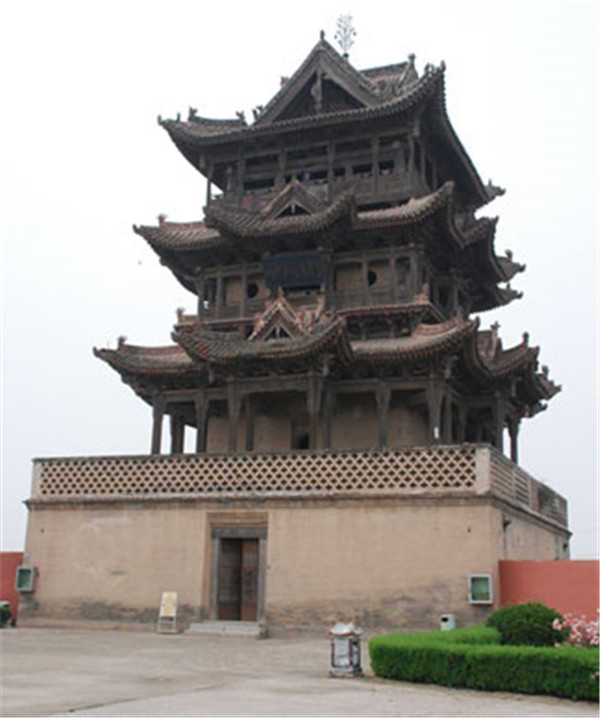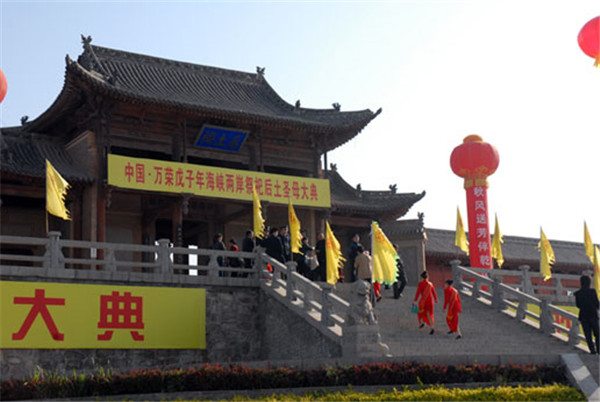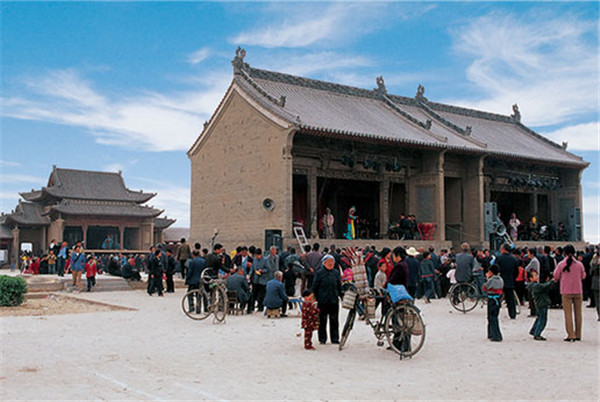
At the confluence of the Yellow River and Fenhe River in Wanrong County, there stands an ancestral temple named Houtu Temple, which is built for the worship and sacrifice to Houtu (God of the Earth) --a female deity in China. With the reputation of “the earliest temple throughout the country”, the Houtu Temple represents the very origin and sources of Chinese nation and civilization. It is the historical link connecting the Chinese people all over the world and the important evidence of Chinese culture extraction.
In the matriarchal clan society of ancient China, the leader of the clan (tribe) is called "Hou", which is the decision-maker, commander of all major issues in the tribe, while Tu means the earth in Chinese. According to The Legend of Kuixiao, land just means mother, the two of them share the similarity of the ability of giving birth and offering the energy to humanity. Thus, "Houtu" is the highest female leader in matriarchal society. In recent studies, more and more scholars proved that the Houtu is actually Nüwa, a goddess in Chinese mythology, the creator of human being, and a famous clan leader in the matriarchal clan society in ancient China. She set up marriage system, multiplied mankind, made Sheng Huang (a reed pipe wind instrument) and created dance music. She made the Chinese civilization emerged as early as about 10,000 years ago. So it can be said that she is the supreme monarch of the earth and the original ancestor of the Chinese nation. Out of reverence, people worshiped and honored her as "Empress of the Earth" and "Empress of Nüwa".

Five thousand years ago, after the conquering of Chiyou in the battle of Zhuolu, the Yellow Emperor accomplished the great unification in China.With a strong desire for ancestor worship, he held the rituals and set the altar on the highland in Miaoqian Village of Fenyin County, the very place Nüwa multiplying the mankind. His unprecedented feat started the future highest-level, largest-scale and longest-term worship and sacrifice to Houtu in Chinese history. Since then, the Royal sacrifice rituals to Houtu have been held here. In the Han Dynasty, the imperial court defined the sacrifice of Houtu as a national ritual system, which clearly stipulated that "the sacrifice ritual o Houtu would be held for every three years, and Tai Mountains would be renovated every five years". In the Tang Dynasty, the scale of sacrifice was further expanded and reached its peak in the Song Dynasty. In these three dynasties alone, there were eight emperors visited Wanrong to offer the sacrifice for more than 20 times. Liu Che (the Emperor Hanwu), Li Longji, (the Emperor Xuanzong of Tang Dynasty) and Zhao Heng(the Emperor Zhenzong of Song Dynasty) all left their own authentic works of writing here. Among them, Chiu Fung Tse (The Song of the Autumn Wind) written by the Emperor Hanwu ranks as a masterpiece throughout the ages, and the inscription Reverence for the Two Saints in Fenyin made by Emperor Zhenzong of Song Dynasty is known as one of the most famous steles in China. It was not until the Ming and Qing dynasties that the Royal sacrificial activities were held in the Tian-Di Tan (The Temple of Heaven and Earth) in Beijing. After that, the Ditan was built, and the Tian-Di Tan was renamed as The Temple of Heaven. In the history, the worship for Houtu by so many emperors bears three main purposes and significance: to appreciate for her creating, multiplying and benefiting humankind; to pray for favourable climatic weathers,a bumper grain harvest and prosperity of the ; and to look forward to the flourishing of the population and stability of the country.

It is said that Houtu's birthday is March 18 of the lunar calendar, so for thousands of years, people would hold the grand sacrificial activities on that day. In recent years, more and more compatriots from Hong Kong, Macao, Taiwan and Chinese overseas have formed the "ancestor worship group" spontaneously and offered the sacrifice in the Houtu Temple. The scale of the local ceremony in spring became larger year by year, with 30,000 participants at most. The Grand Global Sacrificial Ritual in 2003 had pushed this tradition to a climax. With the ritual music, Chinese people from all over the world worshiped their shared ancestor of the Chinese nation. In front of the statue of Houtu, the sluggish smoke told the long yearning of Chinese people for their forbears.
Houtu culture is not only the root and source of Chinese civilization, but also the essence and carrier of national culture. With its unique appeal and cohesive force, it is encouraging the global Chinese to make unremitting efforts and bring about the unification and great rejuvenation of Chinese nation.

